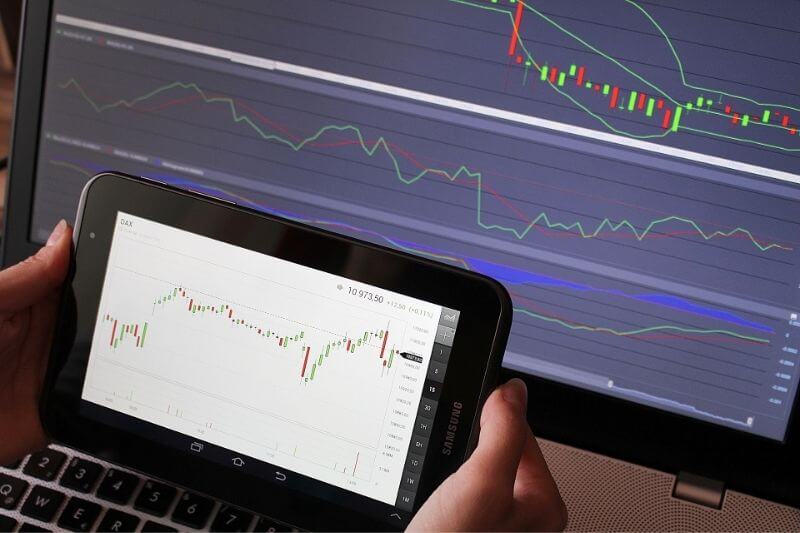No products in the cart.
Want to Trade in Forex? Here’s How

Trading in forex seems to be one of the hot new things that so many people are talking about. On social media, at work, and in casual conversation people are asking what is a forex, how do you trade, and what your opinion is on it, but it is far from a new thing. No, forex trading is not a trend either, it has been a thing for quite some time but it is true that trading has become much easier for beginners. (Image Credits: Csaba Nagy/Pixabay)
The biggest thing to remember is that forex trading is not a get rich quick scheme. It is a real-life business with real-life implications using actual money, so you need to respect it as such. Becoming a forex trader is not hard to do, what is hard is getting good at it. You need to start somewhere first before you start thinking about making consistent gains. Doing this will help set you up to succeed rather than having your head in the clouds thinking you are the next shark in the financial pool. Here is how to start forex trading from a realistic standpoint.
Learn the Terms
First things first, you want to know all the fancy terms that people are using and ones you will need to know when you start trading. There are plenty of terms for trading and the best forex signals will always mention pips, stop-loss, margins, bid/ask price, etc. which are going to be things you will be tasked with. All of these terms relate to the actions and functions of trading, which makes it good to have them in your head when you are working in real-time. There are plenty of terms, but they are easy to learn and you will learn through repetition when you actually start trading.
Choose a Platform
The next thing you need to start trading is picking the right platform for you to use or software to trade. Your trading platform is like your home base. This is where all of your market data, information, account balances, currencies, and charts are going to be. When you see those images of people looking at tons of red and green lines and “candles” (aka rectangles plotted on the lines) that is what a platform is. You need to think about how much the platform may cost, any fees associated, whether you can get it through a broker (more on this next), and choose one that works well. The right platform will make your trading all the more enjoyable.
Pick a Broker
Now we have the broker and this goes in tandem with a platform. Sometimes these are synonymous because brokers will provide you with the software to trade, but not in every case. Not to mention, you can use another platform with many brokers. Regardless, picking a broker is also crucial to enjoying the trading process. Brokers will help set you up and navigate questions, but most importantly they can help oversee your account and help you manage your funds, which is crucial for your efforts in trading. Getting a good broker, along with your platform, is something that you should do for some guided help while you learn the ropes.
Allocate Time for Knowledge
As you did with learning the terms, so you should do with educating yourself more and more each day on the art of trading. Forex trading as mentioned is not a get-rich-quick scheme. It takes a lot of time to get good enough to trade independently without any guidance. Even for the experts who day trade for a living they still find time to read articles, watch videos, and gather as much knowledge as possible. Giving yourself an hour a day to dedicate to learning more techniques, analysis, and figuring out how trading works as a whole will give you long term rewards. There is never a lack of knowledge on a subject, especially finance, so find the time.
Figure Out Your Trading Schedule
Allocating time to learning is important, but so is fleshing out your schedule for trading. If you work a regular 9-5, you can still fit in some trading time. Some people even do it on their 15 or 30-minute breaks. Trading does not have to be long term, you can do short term trades which take seconds or minutes, but doing these quick trades means being efficient and knowing what you are doing. In any case, having a schedule for your trading is important. Set aside as little as 30 minutes a day to check out your account, analyze the chart trends and the market, and take notes. Even just a little bit of time a day trading is still better than none, and eventually you can start doing more as you see fit. Trading futures on the weekend, coming home and doing more trading, and fitting in time during the day all help.
Know Your Limits
Last but not least is understanding how to have some restraint. Too many people go into forex trading thinking that they know it all and can make tons of money quickly, which is not true. Yes, people can be successful, but it is hard and it takes a lot of dedication because of that. Knowing how much money you have to work with is important for your self-restraint too. If you go in reckless, you will leave empty-handed. Not to mention, trading above your means can result in disastrous results if you do not trade within your financial capabilities. Leveraging is something that people can use effectively, but it also means being a capable trader. Knowing your limits for trading will help you make smarter trades, rather than going on emotional highs and lows.
Forex trading is a really useful tool for those that know how it works. It is a great way that people have figured out how to become financially independent and learn new skills, but it is not a walk in the park by any means. Before you start trading on your own, you need some useful knowledge, and the above points should help you learn to trade properly.
















Leave a Reply